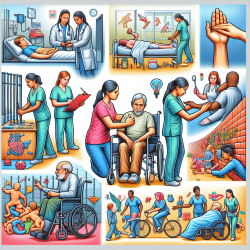Introduction
In the ever-evolving landscape of special education and therapeutic practices, staying informed about the latest research and its practical applications is crucial. The research article titled "Support Needs of Patients with Cushing's Disease and Cushing's Syndrome: Results of a Survey Conducted in Germany and the USA" offers valuable insights into the support needs of patients with these chronic conditions. This blog explores how practitioners can enhance their skills by implementing the findings of this study and encourages further research in this area.
Understanding Cushing's Disease and Syndrome
Cushing's Disease (CD) and Cushing's Syndrome (CS) are characterized by prolonged exposure to elevated cortisol levels, leading to a range of physical and psychological symptoms. These conditions are rare, affecting approximately 2–3 individuals per million annually. The study highlights the significant disease burden and impaired quality of life experienced by patients, even after successful treatment.
Key Findings from the Research
The study surveyed patients from Germany and the USA, revealing several important insights:
- Both German and US patients reported suffering from Cushing-related symptoms, reduced performance, and psychological issues.
- Good medical care and competent doctors were crucial in helping patients cope with the illness.
- US patients showed a greater interest in support groups and courses on illness coping compared to German patients, who preferred brochures.
- Internet-based programs were more popular among US patients, with 89.3% expressing willingness to attend, compared to 75.4% of German patients.
Implications for Practitioners
Practitioners can leverage these findings to improve their support for patients with CD and CS. Here are some actionable steps:
- Enhance Communication: Develop clear communication strategies to ensure patients understand their condition and treatment options.
- Offer Personalized Support: Tailor support programs to meet the cultural preferences and specific needs of patients in different regions.
- Utilize Technology: Implement internet-based programs to reach a broader audience and provide flexible support options.
- Encourage Peer Support: Facilitate support groups where patients can share experiences and coping strategies.
Encouraging Further Research
While this study provides valuable insights, there is a need for further research to explore additional support strategies and cultural differences in patient needs. Practitioners are encouraged to participate in or initiate studies that can lead to more comprehensive support programs for patients with chronic conditions like CD and CS.
Conclusion
By understanding and implementing the findings from the research on Cushing's Disease and Syndrome, practitioners can enhance their skills and provide better support to their patients. This not only improves patient outcomes but also contributes to the development of more effective therapeutic practices.
To read the original research paper, please follow this link: Support Needs of Patients with Cushing's Disease and Cushing's Syndrome: Results of a Survey Conducted in Germany and the USA.










